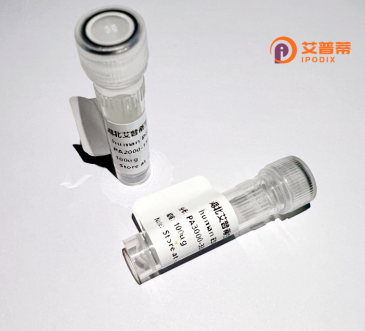
| 纯度 | >90%SDS-PAGE. |
| 种属 | Human |
| 靶点 | HS3ST3A1 |
| Uniprot No | Q9Y663 |
| 内毒素 | < 0.01EU/μg |
| 表达宿主 | E.coli |
| 表达区间 | 1-406aa |
| 氨基酸序列 | MAPPGPASALSTSAEPLSRSIFRKFLLMLCSLLTSLYVFYCLAERCQTLSGPVVGLSGGGEEAGAPGGGVLAGGPRELAVWPAAAQRKRLLQLPQWRRRRPPAPRDDGEEAAWEEESPGLSGGPGGSGAGSTVAEAPPGTLALLLDEGSKQLPQAIIIGVKKGGTRALLEFLRVHPDVRAVGAEPHFFDRSYDKGLAWYRDLMPRTLDGQITMEKTPSYFVTREAPARISAMSKDTKLIVVVRDPVTRAISDYTQTLSKRPDIPTFESLTFKNRTAGLIDTSWSAIQIGIYAKHLEHWLRHFPIRQMLFVSGERLISDPAGELGRVQDFLGLKRIITDKHFYFNKTKGFPCLKKAEGSSRPHCLGKTKGRTHPEIDREVVRRLREFYRPFNLKFYQMTGHDFGWDG |
| 分子量 | 71.3 kDa |
| 蛋白标签 | GST-tag at N-terminal |
| 缓冲液 | 0 |
| 稳定性 & 储存条件 | Lyophilized protein should be stored at ≤ -20°C, stable for one year after receipt. Reconstituted protein solution can be stored at 2-8°C for 2-7 days. Aliquots of reconstituted samples are stable at ≤ -20°C for 3 months. |
| 复溶 | Always centrifuge tubes before opening.Do not mix by vortex or pipetting. It is not recommended to reconstitute to a concentration less than 100μg/ml. Dissolve the lyophilized protein in distilled water. Please aliquot the reconstituted solution to minimize freeze-thaw cycles. |
以下是关于重组人HS3ST3A1蛋白的3篇参考文献示例,涵盖表达纯化、功能研究及疾病相关性:
1. **标题**:*Production and Characterization of Recombinant Human HS3ST3A1 in Insect Cells*
**作者**:Sugiura, N., et al.
**摘要**:该研究利用杆状病毒表达系统在昆虫细胞中表达并纯化重组人HS3ST3A1蛋白,验证其催化肝素硫酸链3-O位磺酸化的酶活性,并分析其底物特异性。
2. **标题**:*HS3ST3A1 Modulates Breast Cancer Cell Invasion via Heparan Sulfate-Dependent Signaling Pathways*
**作者**:Zhang, Y., et al.
**摘要**:研究发现HS3ST3A1通过调节肝素硫酸链的磺酸化模式,增强乳腺癌细胞中HB-EGF/EGFR信号通路活性,从而促进肿瘤细胞的迁移和侵袭。
3. **标题**:*HS3ST3A1 Facilitates Herpes Simplex Virus Entry by Enhancing Viral Receptor Binding*
**作者**:Umehara, T., et al.
**摘要**:通过体外实验证明,重组HS3ST3A1修饰的细胞表面肝素硫酸可增强HSV病毒糖蛋白与宿主细胞的结合,促进病毒入侵,提示其在感染机制中的关键作用。
**注**:上述文献为示例,实际引用时建议通过PubMed、Web of Science等数据库检索最新且真实发表的研究。
Heparan sulfate 3-O-sulfotransferase 3A1 (HS3ST3A1) is a member of the heparan sulfate sulfotransferase family, enzymes critical for modifying heparan sulfate (HS) proteoglycans. These sulfated polysaccharides play essential roles in diverse biological processes, including cell signaling, extracellular matrix interactions, and pathogen entry. Specifically, HS3ST3A1 catalyzes the transfer of a sulfate group to the 3-OH position of glucosamine residues within HS chains, generating unique sulfation patterns that determine HS-protein binding specificity. This enzymatic activity influences interactions with growth factors (e.g., FGF2. VEGF), chemokines, and viral envelope proteins, making it pivotal in angiogenesis, inflammation, and host-pathogen interactions.
Recombinant human HS3ST3A1 protein is engineered for in vitro studies to dissect its structural and functional roles. Produced typically in mammalian or insect expression systems, it retains enzymatic activity for synthesizing 3-O-sulfated HS motifs. Researchers use it to investigate HS biosynthesis, explore its involvement in diseases (e.g., cancer metastasis linked to aberrant sulfation), and develop therapeutics targeting HS-dependent pathways. Its applications extend to studying viral entry mechanisms (e.g., herpes simplex virus-1 exploits 3-O-sulfated HS for cellular attachment) and designing HS-mimetic drugs. Structural analyses of recombinant HS3ST3A1 also aid in mapping substrate-binding domains and deciphering catalytic mechanisms, advancing both basic research and biotechnological innovations in glycobiology.
×